
The National Interest Foundation Newsletter
Issue 284, May 2, 2025
Welcome to our NIF Newsletter. In this week’s edition, we provide analysis regarding what the poll numbers say about President Trump’s second term in office at the 100-day mark, delve into Syria’s crucial pursuit of sanctions relief as it responds to the list of conditions laid out by the United States, and examine how Israel is trying to destabilize the new Syrian government by attacking the country’s territory on a daily basis.
Editor: Bassam Tarbush
What the Poll Numbers Say About President Trump’s Second Term in Office at the 100-Day Mark
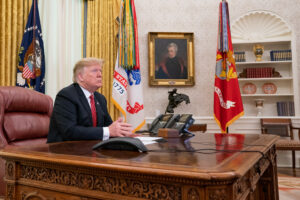
At the 100-day mark, Trump’s approval rating has fallen and he sits below where previous presidents were at similar junctures after the start of their terms. (Photo from The White House)
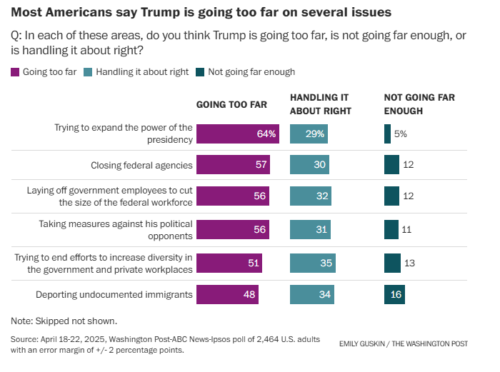
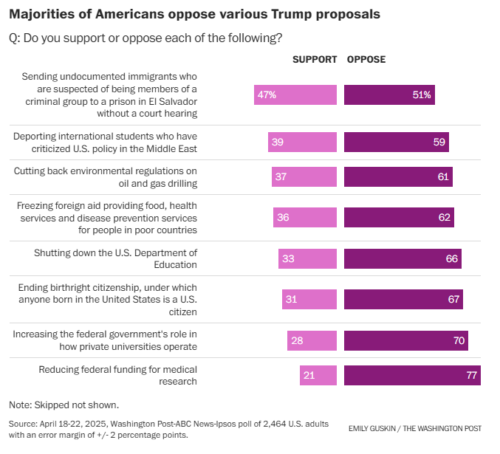
This week saw the 100-day mark of President Trump’s second term in the White House, something that has long been used as a telling and symbolic measuring stick for providing initial insight into public perception of a presidential term. As he reaches and moves beyond this milestone in his presidency, Trump is facing a declining approval rating – the lowest for any newly elected president at 100 days over the past eight decades – in addition to constituents’ growing alarm at his methods and policies. The uncertainty and volatility brought on by Trump’s sweeping tariffs have prompted a notable waning in confidence regarding his ability to handle the economy as well, an area that he made a central point of his 2024 presidential campaign and one that is consistently a top subject of importance for voters. The majority of Americans believe that Trump is going too far on several key issues including with his attempts to expand the power of the presidency, close federal agencies, lay off government employees, and take measures against political opponents, among others. Recent surveys show that most Americans also oppose a variety of Trump proposals such as deporting international students who have criticized U.S. policy in the Middle East, freezing foreign aid providing services for people in needy countries, increasing the federal government’s role in how private universities operate, cutting back environmental regulations on oil and gas drilling, and reducing federal funding for medical research.
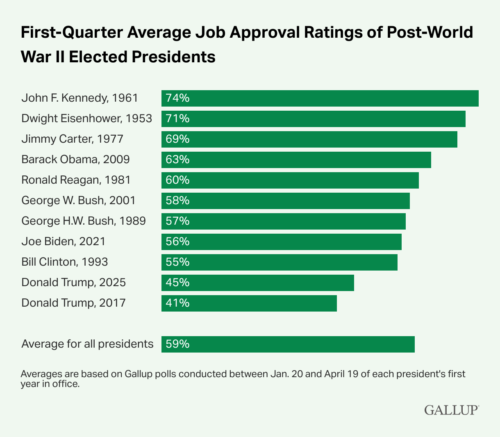
Trump’s average job approval rating at this stage of his presidency is considerably lower than where all of his predecessors since the 1950s stood at the same juncture following the start of their new terms. In fact, the mere recorded lower rating of any post-World War II president compared to his current one came during Trump’s first term back in 2017, with his two approval ratings then and now being the only instances of this sitting below 50% (41% and 45% respectively) at what many view as this early “honeymoon” phase of a presidency. In the past, with the exception of Trump’s two terms, American presidents normally receive pretty favorable ratings somewhere in the range of 55% to 75% – with the average hovering around 60%. This is largely attributable to the narrow window of time for citizens to potentially sour on a president so early on, and thus, Trump’s sub-50% average ratings during both of his terms speak to the substantial backlash that his actions have garnered in such a swift manner. The higher disapproval ratings for Trump can be linked to a more commonplace perception among Americans that his policies have not delivered what they promised, as a majority of survey respondents have regularly expressed that they dislike his actions on tariffs, managing the federal government, foreign policy, and the general state of the economy.
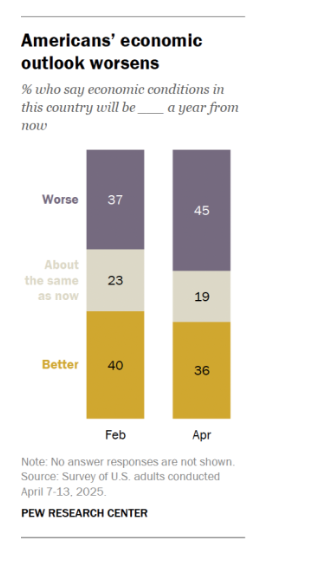
Perhaps most worryingly for Trump, Americans’ sentiment regarding the country’s economic outlook has worsened recently as well. Whereas back in February, 40% believed that economic conditions would be better a year from now compared to 37% who thought it would be worse, now just two months later as of April, only 36% say it will be better vs. a significant uptick of 45% that contend it will be worse. The noteworthy change in such a short period of time is likely due to the effects and expected negative impacts moving forward of Trump’s array of early April tariffs. The tariffs themselves, in addition to the economic disruptions and uncertainty caused by the back-and-forth policies implementing and reversing them, have undoubtedly garnered Trump increased disapproval of his handling of the economy. Other recent polls, like the two below from CBS News, also demonstrate the overwhelming belief that the president’s policies are having negative financial ramifications on the American population and that more are starting to think that Trump does not have a clear plan for tariffs and trade.
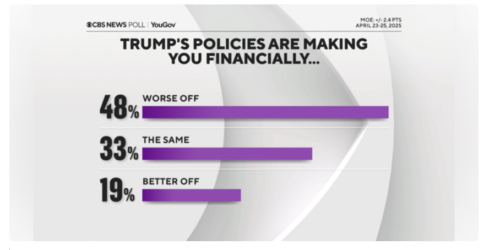
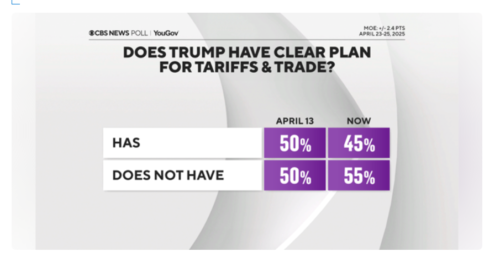
With regard to what Trump’s first 100 days back in office signify about U.S. policy towards the Middle East, experts argue that a few common themes have become apparent, such as his administration’s transactional nature, its reliance on regional powers for mediation efforts, and the threats of military force as a means of trying to contain conflict. Gulf Arab nations with significant financial resources like Saudi Arabia and the United Arab Emirates stand to benefit from the Trump administration’s desire to increase investment and business dealings. Trump officials also appear to be keen on propping these entities up to take on expanded international diplomacy roles, as was seen with Saudi Arabia’s hosting of several rounds of direct U.S.-Russia talks in preceding months. Analysts have noted that Riyadh is in a particularly favorable position to play this role given Saudi leadership’s extensive ties to Trump and his allies, as well as its cooperative relationship with Russia, allowing it to maintain a beneficial “fence-sitting” strategy among the two global powerhouses of the United States and Russia. President Trump’s time back in the White House has shed light on a clear policy of threatening and in some cases using military force as an attempt at deterrence as well, as evidenced by his approach to Iran, the Houthis in Yemen, and others.
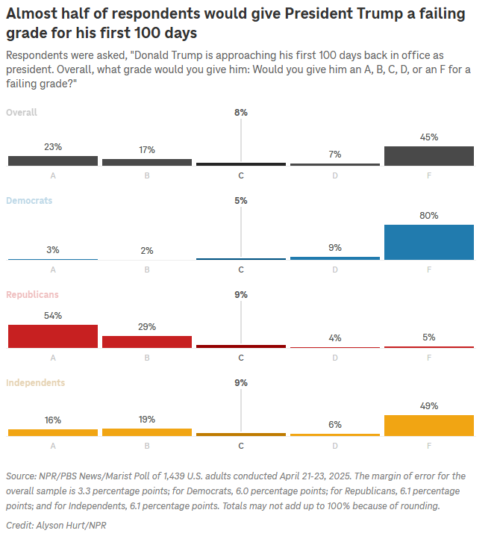
In order to help evaluate Trump’s first 100 days back in office, a poll was also released earlier this week in which respondents were asked to give the president a grade for his performance thus far. Overall, almost exactly twice as many people said that Trump warranted an “F” compared to those who said he deserved an “A” for his first 100 days. While there were certainly obvious and expected partisan divides in the findings, it is notable that close to half of both overall respondents (45%) and Independents (49%) believed that Trump’s time following his return to the White House has been worthy of a failing grade. Even amongst Republicans, only a slight majority (54%) give the president an “A” – a percentage that one would anticipate resembling the massive 80% of Democrats who grade Trump with an “F” if the data was inconsequential and mainly just cut across party lines and affiliations. Instead, the findings illustrate what many other polls and surveys around the 100-day mark have shown, which is that Trump’s policies across-the-board are eliciting dissatisfaction from a majority of Americans.
Syria’s Crucial Pursuit of Sanctions Relief as It Responds to the List of Conditions Laid Out by the United States

Syrian officials have sought to show that the country’s transitional government is addressing the Trump administration’s conditions for U.S. sanctions relief. (Photo from AFP)
Syria’s transitional government has recently responded to a list of conditions made by the Trump administration for U.S. sanctions relief – as it continues its important pursuit of the endeavor. The conditions laid out include the call for Syrian authorities to “adopt a policy of non-aggression to neighboring states, destroy weapons of mass destruction, assist in the recovery of U.S. citizens who have disappeared in Syria, and ensure the security and freedom of all Syrians,” among several other demands. In its response to the United States, Syria has outlined that it has acted on most of the conditions, and that the remaining ones require “mutual understandings” with Washington. Since the ousting of the Assad regime in December of last year, there have been widespread calls for the removal of sanctions against Syria. These measures, imposed by the United States and others, date back multiple decades and were instituted as punitive actions against the repressive Assad regime. While the sanctions were a means of hindering Assad, they also placed a great deal of strain on the Syrian people. Now, with the toppling of the dictatorial regime and the emergence of a new caretaker government, it is critical for both the prospect of a successful transition and the well-being of ordinary Syrian civilians that the opportunity is given for Syria to re-engage with the global market and build the country from the ground up following years of oppressive rule.
The European Union (EU) and the United Kingdom have lifted major sanctions on the new transitional Syrian government, and while the United States did lessen restrictions for 6 months back in January, these alone are simply not enough. It is estimated that over 90 percent of Syrians live below the poverty line, with more than half of the population suffering from substantial levels of food insecurity. Humanitarian aid is required by 16.5 million Syrians to help them meet their basic needs, not to mention that after 14 years of conflict, much of the nation’s infrastructure is all but gone and public facilities like schools, roads, electrical grids, and hospitals are heavily damaged. In other words, the country is currently in dire economic straits. The only way for Syria to truly begin to recover is with the time and money that would be brought about by sanctions relief. Many of the sanctions that the United States has in place have to do with blocking investment and petroleum in Syria. There are also some sanctions that impose an arms embargo, the freezing of assets, and travel bans. Back in February, the EU lifted several sanctions on Syria in the hopes that it will promote an “inclusive political transition” that can lead to economic recovery and stability. If the United States were to remove the sanctions on human essentials and banking, the people of Syria will at least be given a real chance to recover.
In March, it was reported that the Trump administration had given Syria a list of conditions that Damascus must fulfill before sanctions can be removed. Aside from the litany of demands that the United States under Trump is asking for, they also plan to “observe the actions of the interim authorities and will determine (their) actions (in turn) based on a pattern of behavior.” This vagueness and timidity on the United States’ part is simply not a viable solution for Syria. Asaad al-Shaibani, Syria’s foreign minister, explained that “these sanctions force Syria to play the role of an aid dependent country rather than being a partner in global economic growth.” He also described how “these restrictive measures imposed against the previous regime prevent capital and expertise from entering our country while allowing illicit networks to flourish.” As al-Shaibani highlighted during his recent remarks to the United Nations Security Council, Damascus has addressed many of the U.S. conditions, while the others call for mutual cooperation, grace, and leniency towards the new transitional government – all things that Syria and its citizens deserve in the aftermath of the deposing of a brutal regime.
There are a lot of unknowns when it comes to the caretaker government that make the situation complicated, however, many of the challenges that Syria faces are directly affected by the sanctions that are still in place – which were designed to punish the previous Assad regime and its cohorts for their human rights abuses, not the Syrian people as a whole. Infrastructure is lacking, and hospitals are destitute and baren of necessary equipment. While foreign companies are allowed to talk with Syrian officials, banks are still not allowed to process their transactions into Syria. All of this means that much of the country is at a standstill until funding and trade are accessible. To break this predicament, the United States should begin lifting sanctions that would get in the way of basic human rights issues. More specifically, it would be helpful for the Syrian people if sanctions were lifted on global financial systems, energy access, and trade of essential goods because if the current transitional government is to be seen as legitimate by the people, then economic growth and improvements are a necessity. Otherwise, instability will more than likely prevail instead.
Israel is Trying to Destabilize the New Syrian Government by Attacking the Country’s Territory on a Daily Basis

Israel’s actions in Syria since the ousting of Assad have been criticized as a violation of the country’s sovereignty and a threat to its fragile political transition. (Photo from AP)
For many observers, it has become evident that Israel is seeking to destabilize the new government in Syria with its continuous attacks on the country’s territory, including recent airstrikes near the Syrian presidential palace. In the time since the fall of the Assad regime, Israel has waged a campaign of subversion and undermining in Syria, and warrants criticism for its glaring efforts to threaten the fragile political transition taking place there. Israel’s military strikes, bombings, illegal land seizures, and incursions represent a blatant disregard for Syria’s territorial sovereignty and a violation of international law. Israel sent troops to unlawfully occupy a swath of southwestern Syria after the ousting of Assad, and has since entrenched itself in a United Nations-designated buffer zone and carried out regular attacks. Furthermore, even public statements from Israeli government ministers have illustrated the plan for aggression and overreach into Syria, and their desire to thwart the prospects of a strong and unified Syria emerging from the toppling of the Assad regime. Just this week, Israeli Finance Minister Bezalel Smotrich remarked that “Israel will only stop fighting when hundreds of thousands of Palestinians are forcibly displaced from Gaza and Syria is dismantled as a state.” Ultimately, the new government in Damascus and those who wish to maximize the chances of an inclusive and stable Syria have rejected the idea of any form of external interference in the country’s affairs.
While Israel has deceptively sought to portray its missile attacks in Syria under the guise of “defending the Druze,” Syrian Druze leaders themselves have consistently rejected Israeli intervention and declared their loyalty to a united Syria. They have also lamented the destructive efforts to concoct discord among Syria’s diverse population. It is plain to see that Israel is exploiting the Druze as a political tool, as they have done with other regional minority groups in the past such as the Kurds. Israel is claiming that it is championing and protecting the Druze in Syria with its bellicose attacks, when these military strikes are actually in fact aimed at stoking conflict between the transitional government in Syria and minority groups, while also seeking to provoke an attack against Israel by the new Syrian government. Israel wants this to happen, as a response from Syria would fuel further instability and conflict, and in Israel’s eyes, provide it with the opportunity to destabilize and delegitimize the transitional government – both to the Syrian people and the world at-large. Syrian officials have seen through these harmful actions and recently criticized Israel for its meddlesome actions, accusing it of trying to incite tensions in the country. Information Minister Hamza al-Mustafa stated that “Israel is trying to exploit sectarian divisions to gain a foothold in Syria as part of its ongoing plans.” He added that the new government in Damascus has worked to make civil peace a top priority, and has adopted a strategy of openness in order to bring an array of Syrians into the political process. Thus, officials are calling on citizens to not allow attempts at sowing division to succeed, and have reaffirmed the new government’s commitment to protecting all elements of the Syrian population without exception.
Several countries, as well as international organizations like the United Nations, have condemned Israel for its intrusive attacks on Syria, demanding that it “cease its aerial strikes and refrain from any action or interference that may further destabilize Syria.” However, notably, the United States has failed to do so, even though it should be denouncing Israel’s behavior for risking the provoking of further conflict in the region. The new transitional government has already been facing the challenge of governing following the overthrowing of former despot Bashar al-Assad last December, and has been urging for national unity and inclusivity. Turkey’s Ministry of Foreign Affairs has expressed that “the task of the international community is to contribute to the establishment of security and stability in Syria” – something that Israel is seeking to do the exact opposite of with its attempts to weaken and dismantle the country. Since the fall of the Assad regime, Israel has continually attacked Syria, looking to destabilize the burgeoning country’s unity and the legitimacy of the new government. During the preceding months since the change of power in Damascus, Israel has carried out more than 700 strikes targeting Syria, with these actions being a gross violation of Syrian sovereignty and territorial integrity. On the flip side, it is important to note that Syria has not attacked or threatened Israel in any capacity. As such, it is clear that the Israeli attacks are a concerted effort to try and destabilize and delegitimize the transitional government in Syria. It is regrettable that after all of the suffering and hardship that Syria has endured under the previous oppressive and dictatorial regime, Israel is now seeking to obstruct the prospect of stability and prosperity.
Syria has been given an opportunity to recover and stabilize following over 14 years of conflict, and yet Israel continues to undermine the new Syrian government’s sovereignty. It is doing so with its attacks, and also its illegal occupation and recent further infringements on internationally-recognized Syrian territory in the Golan Heights. As officials from the United Nations have outlined, “These actions are a gross violation of Syrian sovereignty and territorial integrity, which under no circumstances need to be called into question – regardless of who holds power in Damascus.” Time and time again, the current Israeli government has demonstrated with its actions that it has no respect for the principles of international law, sovereignty, or human rights.
